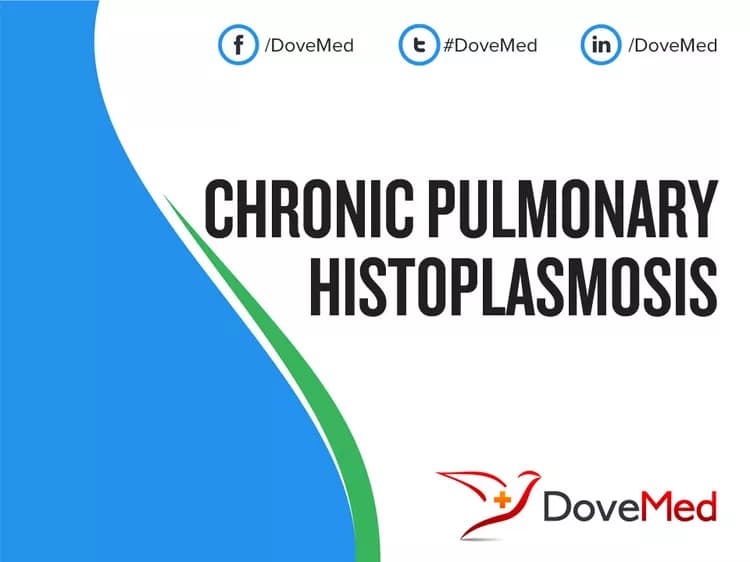What are the other Names for this Condition? (Also known as/Synonyms)
- Chronic Cavitary Histoplasmosis of Lungs
What is Chronic Pulmonary Histoplasmosis? (Definition/Background Information)
- Chronic Pulmonary Histoplasmosis is an infectious disease that causes damage to the respiratory system (lung and airways)
- It is almost always the sequela of acute histoplasmosis infection. This develops by inhaling the spores of the fungus called Histoplasma capsulatum
- The fungus is transmitted through bird and bat droppings that fall on the soil. Eventually, the spore spreads out into the soil
- Individuals with weak immune system or with underlying lung disease are more at risk of Chronic Pulmonary Histoplasmosis
- This chronic infection is characterized by fever, cough, weight loss, and cavity formation in the lungs
- Chronic Pulmonary Histoplasmosis is treated with anti-fungal medications or surgical resection of the lung cavity (in some severe cases)
Who gets Chronic Pulmonary Histoplasmosis? (Age and Sex Distribution)
- Chronic Pulmonary Histoplasmosis can occur at any age, but elderly adults are more likely to be infected
- Both males and females may be affected and there is no gender predilection observed
- All racial and ethnic groups can be affected
- Histoplasmosis is a condition that is seen mainly within the central and eastern parts of United States, as well as in the eastern areas of Canada. Some areas of Mexico, Central American, South America, Africa, and Southeast Asia also have an increased incidence
What are the Risk Factors for Chronic Pulmonary Histoplasmosis? (Predisposing Factors)
Following risk factors are associated with Chronic Pulmonary Histoplasmosis:
- Older adults due to weaker immune system
- Individuals with weak immune system, such HIV patients and those taking immunosuppressive drugs after organ transplantation
- Cancer patients on chemotherapy drugs
- Chronic lung disease
- People living in areas near the Ohio River Valley
- Exploring caves, especially bat caves in the endemic regions
- Those with occupations, such as construction workers, farmers, roofers, and landscapers, working in the endemic region
It is important to note that having a risk factor does not mean that one will get the condition. A risk factor increases ones chances of getting a condition compared to an individual without the risk factors. Some risk factors are more important than others.
Also, not having a risk factor does not mean that an individual will not get the condition. It is always important to discuss the effect of risk factors with your healthcare provider.
What are the Causes of Chronic Pulmonary Histoplasmosis? (Etiology)
- Chronic Pulmonary Histoplasmosis develops by inhaling the spores of fungus called Histoplasma capsulatum
- It is different from its acute form. In the acute form, the condition may self-heal with time; in the chronic form, it remains for a longer period causing severe damage
- The infection is spread by bird and bat droppings, which is transmitted to humans through inhalation
- The infection cannot spread from one individual to another through contact
What are the Signs and Symptoms of Chronic Pulmonary Histoplasmosis?
The signs and symptoms that are associated with Chronic Pulmonary Histoplasmosis include:
- Fever
- Productive cough with sputum that may contain blood or pus
- Breathing difficulties
- Chest pain
- Weight loss
How is Chronic Pulmonary Histoplasmosis Diagnosed?
The diagnosis of Chronic Pulmonary Histoplasmosis may include:
- Complete evaluation of medical history along with a thorough physical exam
- Following tests are generally carried out to diagnose the condition:
- Culture of body fluids, such as sputum, to identify the fungus
- Detection of histoplasma antigen in urine
- Blood test to measure antibodies against fungus
- Imaging studies such as chest x-rays and CT scan of the chest
- Bronchoscopy: In which both the airways and lungs are examined with the help of a scope and simultaneously tissue is also taken for biopsy (for examination under a microscope by the pathologist)
Many clinical conditions may have similar signs and symptoms. Your healthcare provider may perform additional tests to rule out other clinical conditions to arrive at a definitive diagnosis.
What are the possible Complications of Chronic Pulmonary Histoplasmosis?
The possible complications associated with Chronic Pulmonary Histoplasmosis include:
- Acute respiratory distress syndrome (failure of the respiratory system)
- Meningitis: Infection of the membranes covering the brain
- Damage to the adrenal gland causing problems with hormone production such as steroids
How is Chronic Pulmonary Histoplasmosis Treated?
- Anti-fungal medication, such as amphotericin B, is used to treat Chronic Pulmonary Histoplasmosis
- Surgical resection of the lung cavity may be done in a few cases
- Symptomatic treatment for the fever and other symptoms
- Rest and diminished physical activity
How can Chronic Pulmonary Histoplasmosis be Prevented?
Chronic Pulmonary Histoplasmosis can be prevented through the following measures:
- Careful monitoring will help in early detection and treatment
- The risk of the condition is high in individuals with suppressed/weak immune system. Hence, those with weak immune systems should:
- Avoid exposure to soil in areas with high risk of fungal spores
- Avoid exploring bat caves
- Get the early symptoms of the disease appropriately treated
Individuals with weak immune system should get appropriate treatment as soon as possible, after a diagnosis of the condition is confirmed.
What is the Prognosis of Chronic Pulmonary Histoplasmosis? (Outcomes/Resolutions)
- The prognosis of Chronic Pulmonary Histoplasmosis depends on the severity of the condition and immune status of the individual
- In many cases, it is treatable with anti-fungal medications
- Those with weak immune systems are at a risk of life-threatening or disseminated disease
Additional and Relevant Useful Information for Chronic Pulmonary Histoplasmosis:
The following DoveMed website link is a useful resource for additional information:
https://www.dovemed.com/diseases-conditions/infection-center/
Related Articles
Test Your Knowledge
Asked by users
Related Centers
Related Specialties
Related Physicians
Related Procedures
Related Resources
Join DoveHubs
and connect with fellow professionals


0 Comments
Please log in to post a comment.